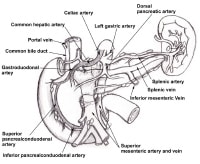Abdominal angina is defined as the postprandial pain that occurs in individuals with sufficient mesenteric vascular occlusive disease such that blood flow cannot increase enough to meet visceral demands. The mechanism is believed to be similar to the angina pectoris that occurs in individuals with coronary artery disease or the intermittent claudication that accompanies peripheral vascular disease, as depicted in the image below.
 The superior mesenteric artery and inferior mesenteric artery share collateral circulation near the splenic flexure of the colon. When dilated, this vessel is termed the meandering mesenteric artery. As seen on an angiogram, this is a sign of chronic mesenteric ischemia.
The superior mesenteric artery and inferior mesenteric artery share collateral circulation near the splenic flexure of the colon. When dilated, this vessel is termed the meandering mesenteric artery. As seen on an angiogram, this is a sign of chronic mesenteric ischemia.  The pancreaticoduodenal arcades are collateral pathways between the celiac artery and the superior mesenteric artery.
The pancreaticoduodenal arcades are collateral pathways between the celiac artery and the superior mesenteric artery.
Although Schnitzler first described the clinical picture of postprandial clinical pain in 1901, description of the syndrome of postprandial abdominal angina generally is attributed to Baccelli or Goodman (1918). In 1936, Dunphy recognized that this syndrome was a precursor of fatal intestinal necrosis; however, not until 1957 did Mikkelsen propose surgical treatment of occlusive mesenteric vascular disease. Shaw and Maynard reported the first transarterial thromboendarterectomy of the superior mesenteric artery (SMA) in 1958, followed in rapid succession by Mikkelsen and Zarro in 1959. Numerous technical refinements followed.
 The superior mesenteric artery and inferior mesenteric artery share collateral circulation near the splenic flexure of the colon. When dilated, this vessel is termed the meandering mesenteric artery. As seen on an angiogram, this is a sign of chronic mesenteric ischemia.
The superior mesenteric artery and inferior mesenteric artery share collateral circulation near the splenic flexure of the colon. When dilated, this vessel is termed the meandering mesenteric artery. As seen on an angiogram, this is a sign of chronic mesenteric ischemia.  The pancreaticoduodenal arcades are collateral pathways between the celiac artery and the superior mesenteric artery.
The pancreaticoduodenal arcades are collateral pathways between the celiac artery and the superior mesenteric artery. Although Schnitzler first described the clinical picture of postprandial clinical pain in 1901, description of the syndrome of postprandial abdominal angina generally is attributed to Baccelli or Goodman (1918). In 1936, Dunphy recognized that this syndrome was a precursor of fatal intestinal necrosis; however, not until 1957 did Mikkelsen propose surgical treatment of occlusive mesenteric vascular disease. Shaw and Maynard reported the first transarterial thromboendarterectomy of the superior mesenteric artery (SMA) in 1958, followed in rapid succession by Mikkelsen and Zarro in 1959. Numerous technical refinements followed.
ليست هناك تعليقات:
إرسال تعليق